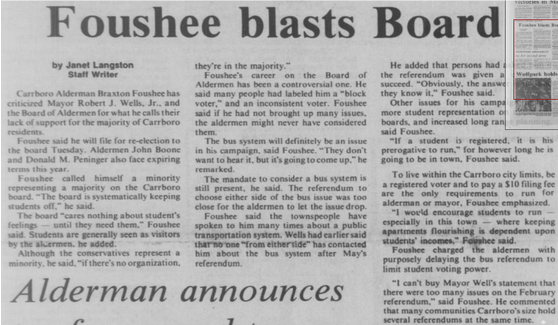In October, Carrboro’s Town Council requested information from staff about renaming a street for Braxton Foushee after a presentation from Dave Mason, the President of the Lincoln High School Alumni Association, Pat Mason, and Chapel Hill-Carrboro NAACP President Herman Foushee. The Masons and Foushee suggested Carr Street as a possibility for a renaming.
On Wednesday, Town Council asked staff to begin the process of street renaming and to notify residents and property owners on Carr Street, which was named for the white supremacist Julian Carr (who is also the namesake of Carrboro.)
We could not think of a better or more apt renaming.
Much was said about Foushee Wednesday night from a variety of community members about his long-standing commitment to advancing civil rights and Carrboro: He’s a central figure in Chapel Hill and Carrboro’s civil rights movement, currently serves on the Planning Board, became Carrboro’s first Black alderman in 1969, is a key figure in obtaining (and expanding) bus service in Carrboro, and fought tirelessly, for decades, to extend water and sewage service to the Rogers Road community.
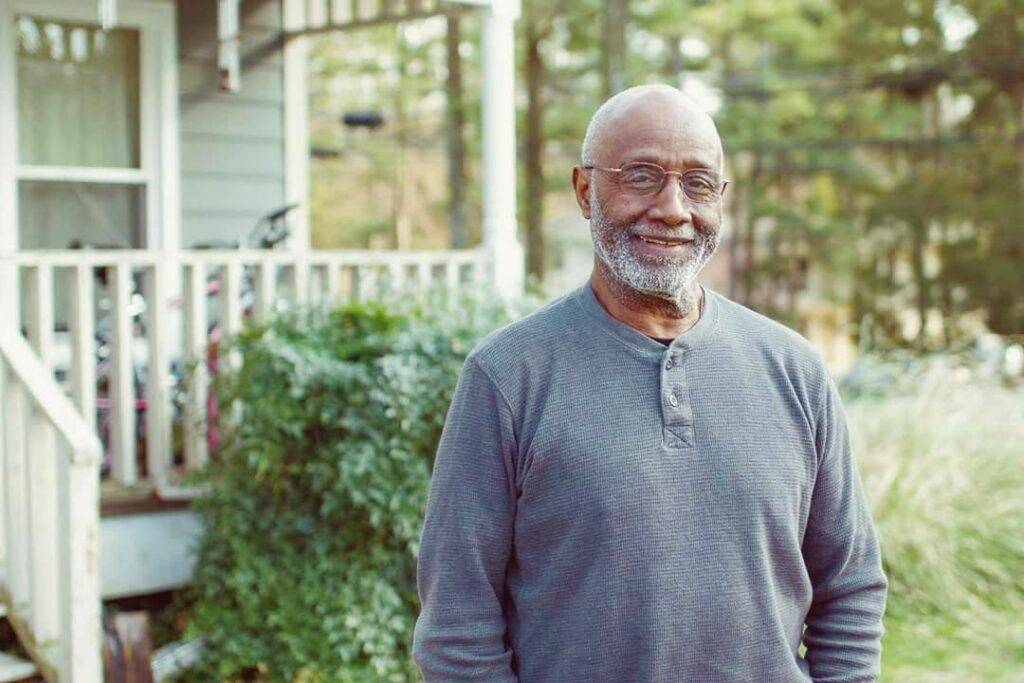
Civic and civil rights work for over 60 years
Foushee participated in the sit-in at Colonial Drug Store in 1960, a seminal moment in Chapel Hill’s civil rights history. His first mention in The Daily Tar Heel came a year later, on January 13, 1961, when he was appointed to a committee working to integrate Chapel Hill’s Varsity Theater. He led desegregation marches in Chapel Hill and helped advocate for equal pay for Black residents in Carrboro. He escorted older Black residents to vote.
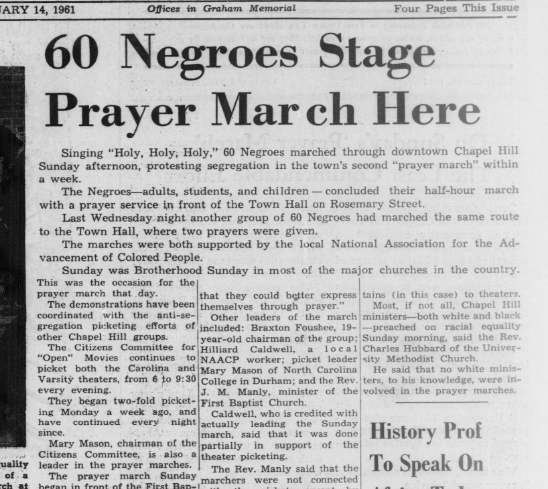
There have been many profiles of Foushee over the years, but his role in launching Carrboro’s bus system is often mentioned in passing. That accomplishment is worth a feature of its own.
It took years and years of concerted effort and building a progressive political coalition that worked doggedly, for years, to bring bus service to Carrboro, and then ensure that it would remain in Carrboro.
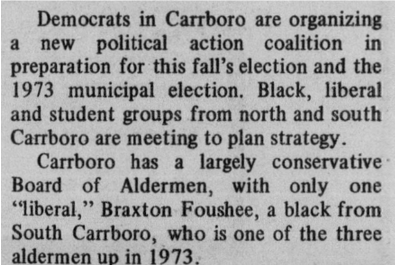
Foushee’s multi-year battle for keeping bus service
When a petition calling for a referendum on bus service was initially presented to the aldermen, the DTH reports that the “Aldermen passed the petition around and expressed concern that many of the addresses were of apartments and that they were not familiar with many of the names.” (Ed note: Hmm.)
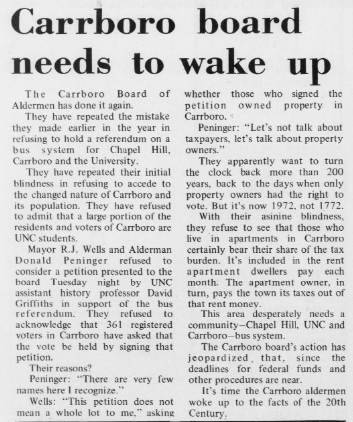
Foushee was the sole vote for the first bus referendum, in 1971, which did not pass. Mayor Wells’ then insisted on receiving another petition for a public hearing. After 450 signatures were collected, there was a public hearing, a straw poll, more meetings, delays, and the refusal to put public transportation in the town budget. (Foushee was the lone vote against the budget for this reason.)
Foushee made the bus issue and the alderman’s “stifl[ing] student input” a central part of his reelection campaign. The DTH called him the “only incumbent on the Carrboro board who deserves to be reelected.”
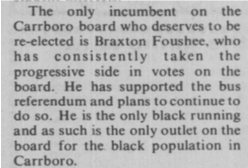
Foushee was the top vote getter in the ‘73 race, but that year a second bus referendum failed. There were more delays, more calls for non-action. But Foushee kept working to bring more students and progressives into the fold. In 1976, Carrboro approved putting another referendum to the voters, to finance an extension of Chapel Hill’s bus service.

It also failed. The DTH reported that “an unusually heavy turnout of Carrboro property owners and a light student turnout combined the defeat the referendum, which would have given the aldermen authority to levy up to a 10 cent property tax for bus service.”
A year later, Bob Drakeford was elected mayor. Much of his focus was on public transit and advancing cycling infrastructure in the town. Like Foushee, he pushed for the buses (and created the map for the bus system at his kitchen table, a fact he recounted in his podcast shortly before his death.)
In 1980, there was a fourth chance for the bus referendum. UNC Student Government went door to door in Carrboro, ensuring that they hit every precinct. They worked with the progressive Carrboro Community Coalition, which backed Foushee. The referendum passed.
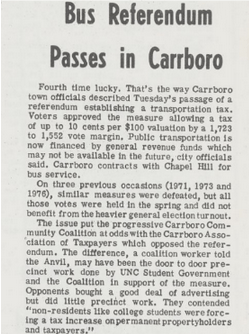
Foushee left the Board of Alderman in 1981. Bringing bus service to Carrboro was not his only accomplishment on council: he also helped save Carr Mill Mall, helped create Hank Anderson Community Park with Drakeford, and brought pedestrian infrastructure to Black areas in Carrboro. His work in the 70s sparked an investigation from state agencies into Carrboro’s police force, which then diversified. He works on voter registration, serves as a precinct judge and jury commissioner, and works the polls.
We’re thrilled that Carrboro is naming a street in his honor, for many reasons—but one key reason is this: If you’ve ridden the (free and very nice) bus in Carrboro, you have Foushee to thank.
We are also looking forward to the Braxton Foushee Day of Service, which will take place on December 13. It’s a chance for everyone in Carrboro to do community service in his honor. We hope you take the bus there.

